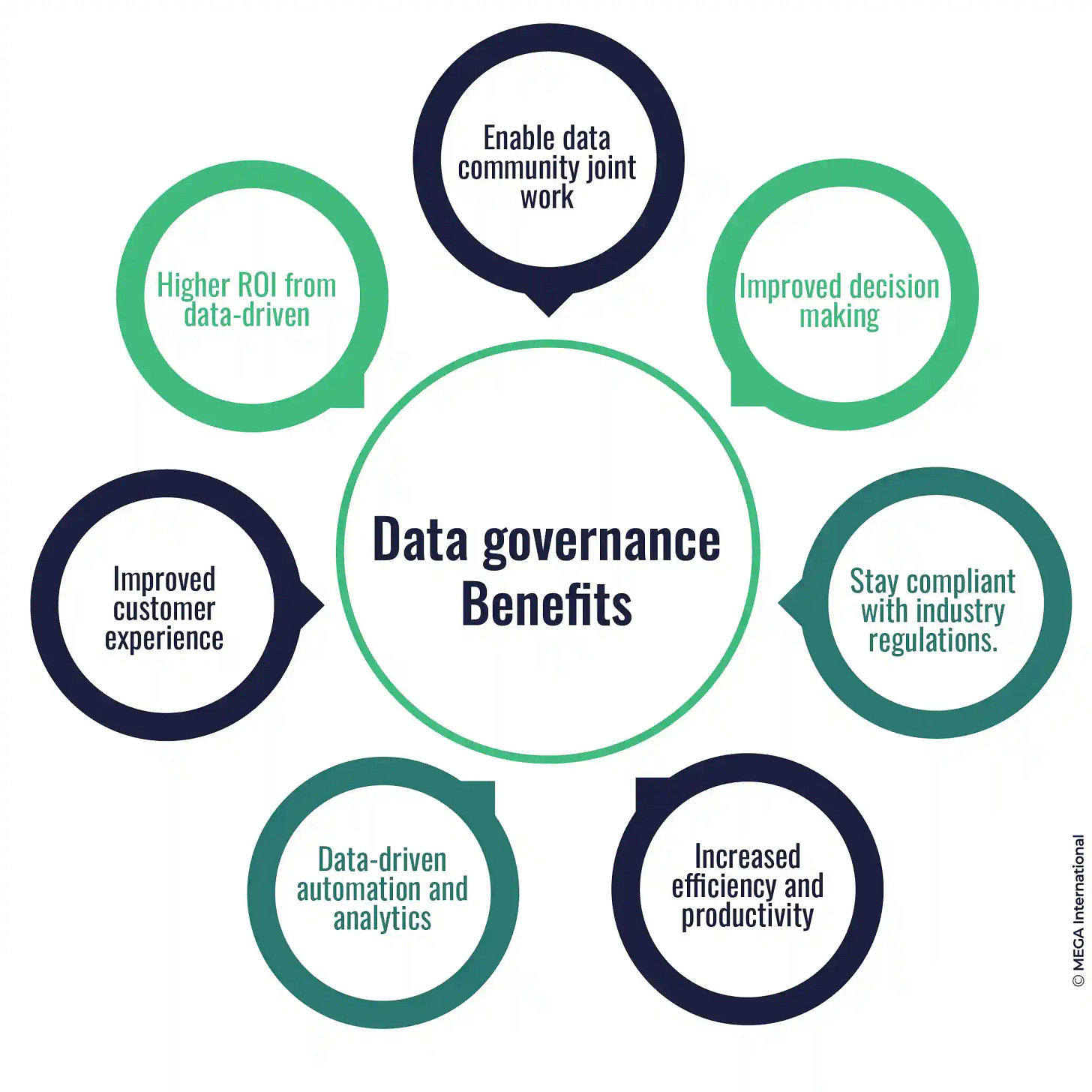The Benefits of Strong Data Governance and Data Security for Businesses
Data governance and data security are crucial aspects of any business, regardless of industry or size. With the increasing reliance on digital systems and the abundance of sensitive information being shared and stored online, it’s more important than ever to have strong data governance and data security practices in place.
Here are some of the key benefits that businesses can reap from implementing strong data governance and data security measures:
Increased efficiency and productivity: Strong data governance and security practices can lead to increased efficiency and productivity for businesses. When data is organized, well-managed, and secure, employees can easily access and use the information they need to get their work done. This can save time and reduce frustration, allowing employees to focus on their core responsibilities and tasks. For example, if an employee needs to access customer data for a sales presentation, they should be able to easily locate and access that data without having to search through multiple systems or folders. This not only saves time, but it also helps to ensure that the employee is using accurate and current data, which can improve the overall quality of their work.
Improved decision-making: Accurate, up-to-date, and secure data is essential for informed decision-making. Strong data governance ensures that data is properly labeled, stored, and maintained, making it easier for decision-makers to access and analyze the information they need. This can help businesses make more informed and strategic decisions, leading to better outcomes and results. For example, if a business is considering expanding into a new market, they will need accurate and current data on that market, such as demographics, economic conditions, and competition. Strong data governance can help ensure that this data is easily accessible and reliable, allowing the business to make a more informed decision about whether or not to pursue the expansion.
Enhanced customer trust and satisfaction: Customers are more likely to trust and do business with a company that demonstrates a commitment to data security. By protecting customer data and being transparent about data collection and use, businesses can build customer trust and satisfaction. This can lead to increased customer loyalty and positive word-of-mouth, benefiting the overall success of the business. For example, if a business is transparent about how it uses customer data, such as for personalized marketing or product recommendations, customers may be more likely to trust the company and continue doing business with them. On the other hand, if a business is not transparent about its data practices or suffers a data breach, it may lead to a loss of customer trust and satisfaction.
Reduced risk of data breaches and cyber attacks: Data breaches and cyber attacks can be costly and damaging to a business’s reputation. Strong data governance and security measures can help prevent these types of incidents and minimize the risk of data being compromised. This can help protect the business’s assets and reputation, as well as reduce the financial and legal consequences of a data breach. For example, implementing strong passwords, regularly updating software and systems, and training employees on cybersecurity best practices can all help to reduce the risk of a data breach. In the event of a data breach, having a plan in place for responding and recovering can help minimize the damage and get the business back up and running as quickly as possible.
Compliance with regulations and industry standards: Many industries have specific regulations and standards related to data governance and security. By implementing these measures, businesses can ensure compliance and avoid fines or other penalties. This can help businesses avoid legal and financial risks, as well as maintain their reputation and credibility within their industry. For example, in the healthcare industry, HIPAA regulations require businesses to have strong data governance and security practices in place to protect patient data. Failing to comply with these regulations can result in fines and other penalties, as well as damage to the business’s reputation. By implementing strong data governance and security measures, businesses can ensure that they are meeting these regulations and industry standards.
So, what are the key elements of strong data governance and data security?
Data classification: Data classification is the process of categorizing data based on its sensitivity and importance to the business. This helps to determine the level of protection and access that different types of data require. For example, confidential financial information may require a higher level of protection than general marketing data. Data classification can involve creating a hierarchy of data categories, such as confidential, sensitive, internal, and public, and assigning each type of data to the appropriate category.
Data access and permissions: Data access and permissions refer to the controls that are put in place to ensure that only authorized individuals can access sensitive information. This can involve setting up user accounts and permissions, as well as implementing multi-factor authentication for accessing certain systems or data. It’s important to grant access to data on a need-to-know basis, and to regularly review and update access permissions to ensure that they align with current business needs.
Data storage and backup: Data storage and backup refers to the processes and systems used to store and protect data. This includes storing data on secure servers or cloud systems, as well as regularly backing up data to prevent data loss due to hardware failures or other issues. It’s important to have redundant storage systems and backup procedures in place to ensure that data is always accessible and recoverable.
Data protection and encryption: Data protection and encryption involves using appropriate security measures to prevent unauthorized access or tampering with data. This can involve encrypting data at rest (when it is stored) and in transit (when it is being transmitted), as well as using secure protocols for data transmission. Encrypting data helps to protect it from being accessed or modified by unauthorized parties.
Data retention and disposal: Data retention and disposal refers to the policies and processes for retaining and disposing of data. It’s important to have policies in place for how long different types of data should be kept, as well as procedures for securely deleting data when it is no longer needed. This can help prevent data clutter and ensure that only relevant and current data is being used
Data breaches and incident response: Data breaches and incident response refers to the plan and procedures in place for responding to data breaches or other security incidents. This can involve working with a cybersecurity team or third-party vendor to assess the situation and implement appropriate measures to prevent further damage. It’s important to have a clear and well-communicated plan in place for responding to data breaches, as well as regularly testing and updating the plan to ensure effectiveness.
Data training and awareness: Data training and awareness refers to the efforts to educate employees about data governance and security practices. This can include training on data classification, access and permissions, and proper data handling procedures, as well as ongoing efforts to raise awareness about best practices and updates on new policies or procedures. Investing in data training and awareness helps to ensure that employees are equipped with the knowledge and skills needed to handle data responsibly and protect the company’s assets.
In addition to training, it’s important for businesses to have ongoing efforts to raise awareness about data governance and security. This can include regular reminders about best practices and updates on new policies or procedures.
By investing in data training and awareness, businesses can ensure that their employees are equipped with the knowledge and skills needed to handle data responsibly and protect the company’s assets. This, in turn, helps to strengthen the overall data governance and security of the organization.
In conclusion, strong data governance and data security are essential for businesses of all sizes and industries. By implementing appropriate measures and practices, businesses can improve efficiency and productivity, enhance customer trust and satisfaction, reduce the risk of data breaches and cyber attacks, and ensure compliance with regulations and industry standards. It’s important for businesses to regularly review and update their data governance and security practices to ensure that they are meeting the evolving needs of the organization and the changing landscape of cyber threats.
Read More:
Why data access control should be part of Data Security?
Do you know The Importance of Data Governance and Data Security in Modern Organizations? Please read the blog article published earlier – https://ajaypatel.me/ajsnewsletter/the-importance-of-data-governance-and-data-security-in-modern-organizations/
References:
“Data Governance: A Beginner’s Guide” (https://www.information-management.com/guides/data-governance-beginners-guide)
“Data Security: A Beginner’s Guide” (https://www.information-management.com/guides/data-security-beginners-guide)
“The Importance of Data Governance in the Digital Age” (https://www.forbes.com/sites/forbestechcouncil/2017/09/26/the-importance-of-data-governance-in-the-digital-age/?sh=5869e9e34f7c)
“The Importance of Data Security for Businesses” (https://www.investopedia.com/terms/d/data-security.asp)




